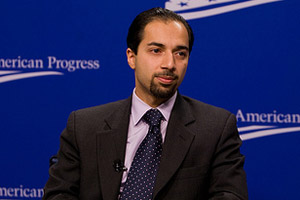Trita Parsi, the head of the National Iranian American Council (NIAC), has been accused by some on the right of working for the Iranian regime, despite the fact that NIAC has regularly criticized Iran for human rights abuses and its illegitimate election. Today, in the Huffington Post, Parsi continues that practice, calling on President Barack Obama to be more outspoken about abuses in Iran:
[T]he failure to make human rights a prominent part of the talks has been problematic, both in terms of support for talks inside Iran, and for the long-term prospects of finding a sustainable, positive relationship with Iran. Unfortunately, fear in the White House that a forward leaning posture on human rights could jeopardize progress on the nuclear front may have prevented broadening the agenda.
The end result is a vacuum on the human rights front from the American side with several negative effects. First, the Ahmadinejad government may have been left with the impression that it can get away with almost any human rights abuses due to America’s compromised position in the region. Second, the green movement—which represents a force for moderation in the country—is turning increasingly skeptical about US intentions. While opinions differ within the movement as to the wisdom of US-Iran diplomacy at this time, the neglect of human rights fuels pre-existing suspicions about the objectives of American diplomacy. That is, the fear that the US is solely interested in reaching a nuclear deal and may be willing to sacrifice the Iranian people’s aspirations in the process.
It will be interesting to see if any of Parsi’s critics notice his article. It’s certainly critical of the regime. It’s also critical of the US—and with some cause. There’s an abundance of evidence that when it comes to Iran, America’s main goal is reaching a nuclear deal, not helping the Iranian people. One of the many ways the nuclear program helps the regime is by drawing Western focus away from human rights issues in Iran—and towards an issue where most Iranians agree with the government. As always with Iran, there aren’t any easy answers.














